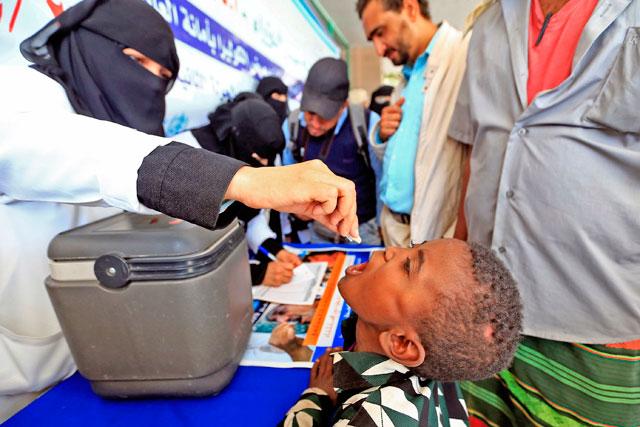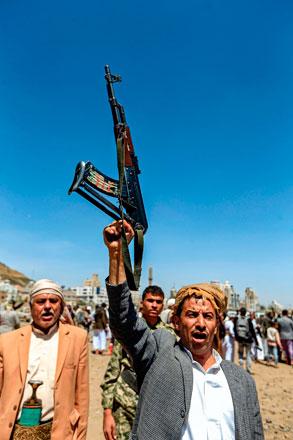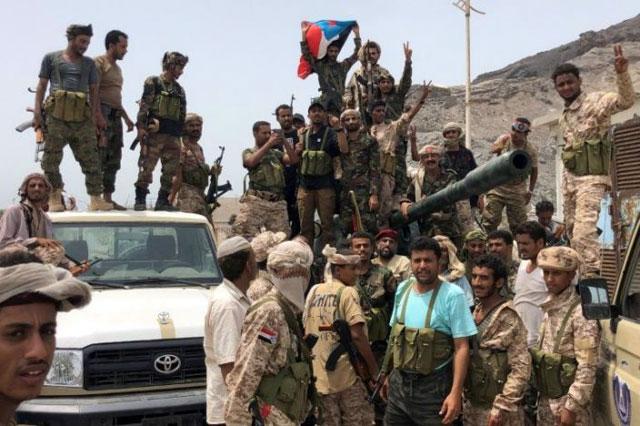You are here
Yemen pounded by war for five years
By AFP - Sep 15,2019 - Last updated at Sep 15,2019

A Yemeni child receives an oral cholera vaccine from a Houthi rebel-run health authorities volunteer during a vaccination campaign in the capital Sanaa on Saturday (AFP photo)
SANAA — Saudi Arabia, whose oil installations have again been targeted by drone attacks, launched military operations in Yemen in 2015 to help the government there push back against Houthi rebels.
On Saturday the world's biggest oil exporter said the pre-dawn strike, claimed by the Yemeni rebels, had sparked fires at two Saudi Aramco oil facilities.
Impoverished Yemen has been mired in a devastating conflict since the Iran-aligned fighters seized the capital Sanaa five years ago.
Here is a broad overview:
Sanaa falls
On July 8, 2014, Houthi fighters from the country's rebel Zaidi Shiite minority launch an offensive from their northern stronghold of Saada.
In September, they enter Sanaa, seizing the government's headquarters. Days later, rebel leader Abdelmalek Al Houthi hails the "victory" of a "popular revolution".
The rebels ally themselves with military units loyal to ex-president Ali Abdullah Saleh, who was forced to quit after a 2011 uprising.
In October, they capture the Red Sea port of Hodeida, a crucial entry point for imports and humanitarian aid.
In January 2015, they seize the presidential palace in Sanaa, after heavy fighting, and surround the residence of President Abed Rabbo Mansour Hadi, who flees to the southern port of Aden.
Riyadh enters war
A coalition led by Sunni-ruled Saudi Arabia, a bitter rival of Shiite Iran, enters the conflict in March 2015 with air strikes on the rebels.
Around a dozen countries form part of the coalition, including five from the Gulf. Washington says it contributes logistics and intelligence.
As the rebels advance southwards on Aden, Hadi leaves, taking refuge in Riyadh.
In July, his embattled administration announces its forces have retaken the entire province of Aden, their first success since the military coalition intervened. The city becomes the country's de facto capital.
By August, pro-government forces have retaken five southern provinces. In October, they reclaim the Bab Al Mandab Strait, an internationally vital shipping route.
Splits emerge in the rebel camp in 2017 and Saleh is assassinated in December by his former Houthi allies.
Battle for aid port
In June 2018, government fighters, backed by Saudi and Emirati land forces, launch an offensive to retake the crucial port of Hodeida.
UN-brokered peace talks between the warring parties open in Sweden in December, yielding a series of breakthroughs including a ceasefire in Hodeida where combat largely ceases.
In May 2019, the UN announces the rebels have withdrawn from Hodeida and two other nearby ports, the first practical step on the ground since the ceasefire deal.
Southern separatists
The anti-Houthi camp is also divided, notably in the south where fighting between separatists and pro-government forces threatens to create "a civil war within a civil war".
Southern Yemen was an independent state before its unification with the north in 1990, and separatists remain powerful.
In January 2018, heavy fighting breaks out in Aden between government forces and southern separatists previously allied with the presidential camp.
In August this year, deadly new clashes break out between the pro-independence Security Belt forces who are supported by the UAE, and pro-government fighters.
The separatists eventually seize Aden and other parts of the south, and retain control despite briefly being pushed out in a see-sawing battle.
The new front exposes a rift between the UAE and Saudi Arabia, who are effectively backing different sides in the south despite being partners in the anti-Houthi coalition.
Humanitarian crisis
Yemen's conflict has killed tens of thousands of people, mostly civilians, relief agencies say.
It has triggered what the UN describes as the world's worst humanitarian crisis, with an estimated 80 per cent of the population needing some form of humanitarian or protection assistance.
The UN children's agency UNICEF described the conflict as "a living hell" for children, with 1.8 million under-fives suffering severe malnutrition.
As the conflict widens, the United States says in September that it is in talks with the Houthis seeking to end the war.
The negotiations open a direct channel between President Donald Trump's administration and the Houthis amid the threat of a broader regional conflict with Iran.
Related Articles
SANAA — Impoverished Yemen has been mired in a devastating conflict since Iran-backed fighters overran the capital Sanaa five years ago prom
SANAA — Impoverished Yemen has been mired in a devastating conflict since Iran-backed fighters overran the capital Sanaa more than
ABU DHABI — A campaign to drive the Houthi movement from Yemen's main port of Hodeida, which resumed this month after peace talks failed, wi













